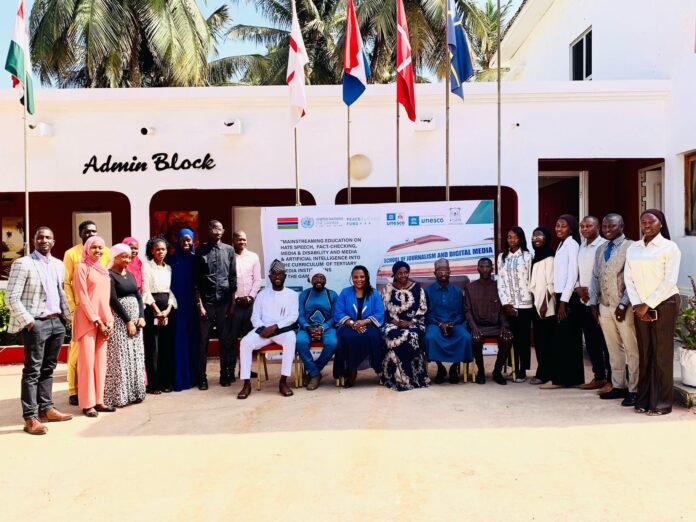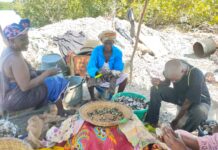By: Sainabou Sambou
The University of The Gambia (UTG), in collaboration with UNESCO, has taken steps toward revolutionizing media education by developing a new Artificial Intelligence (AI) curriculum designed to tackle hate speech and misinformation and promote social harmony.
The initiative, spearheaded by UTG’s School of Journalism and Digital Media (SJDM), was unveiled during a recent validation workshop aimed at equipping future journalists with tools to navigate the challenges of the digital age.
The workshop, supported by UNESCO’s Regional Office for West Africa BREDA, brought together experts, educators, and stakeholders to refine a draft curriculum integrating critical topics such as hate speech, misinformation, media accessibility for people with disabilities, and the ethical use of AI.
Prof. Melchizedec J. Onobe, Dean of SJDM, opened the event with gratitude to UNESCO and the team behind the curriculum, underscoring the media’s pivotal role in shaping public discourse amid a surge in digital challenges.
“The digital evolution offers immense opportunities, but it also brings risks—misinformation, exclusion, and ethical dilemmas tied to AI,” Prof. Onobe said. “This curriculum will prepare media professionals to address these issues responsibly and foster peace in our society.”
Lamin Jarjou, Senior Programme Officer at the Gambia National Commission for UNESCO (NATCOM), echoed this urgency, calling for a sweeping reform in media education. Representing NATCOM’s Secretary General, Jarjou highlighted the curriculum’s focus on fact-checking, combating hate speech—especially on social media—and leveraging AI to enhance journalism. “The media wields power to unite or divide,” he warned, praising UNESCO’s global frameworks like the Media Development Indicators and the Media and Information Literacy Programme for guiding the effort.
The curriculum falls under the UN Peacebuilding Fund’s “Infrastructures for Peace” project, which seeks to strengthen social cohesion in The Gambia. Ms. Golda Keng, Coordinator Secretary for the UN Resident Coordinator’s Office, emphasized its broader significance. “This isn’t just about training journalists—it’s about building a society rooted in truth and dialogue,” she said. Keng urged stakeholders to view the curriculum as a vital peacebuilding tool, not a mere academic exercise and commended UTG, UNESCO, and NATCOM for their collaborative leadership.
Prince Bubacarr Aminata Sankanu, a lecturer and the project’s AI focal person, confirmed that SJDM plans to roll out the curriculum once validation and quality assurance processes are complete. “This is a game-changer for media education in The Gambia,” he said, noting its potential to produce journalists equipped to uphold ethics and counter divisive narratives.
As hate speech and misinformation continue to threaten social stability, UTG’s initiative signals a proactive effort to harness AI for good, ensuring that the next generation of Gambian journalists can promote peace and accountability in an increasingly complex media landscape.






